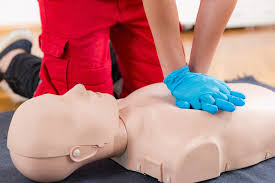
Promulgation of School CPR: A Lifesaving Initiative for India
In India, heart attacks and cardiac arrests claim two lives every minute, leading to an alarming annual death toll of 4.5 million, many of whom are in their prime. Immediate cardiopulmonary resuscitation (CPR) has the potential to drastically reduce these fatalities by half to one-fourth. However, while many European countries have successfully promoted bystander CPR, resulting in 50% of heart attack victims receiving timely assistance, India’s rate ranges from a mere 0-10%.
Recognising the critical need for widespread CPR training, AIIMS, New Delhi, with financial backing from the Indian Council of Medical Research (ICMR), undertook a pioneering study under the guidance of Dr. Sanjeev Bhoi, Professor of the Emergency Medicine Department. Conducted over three years with 4,500 students from 15 schools in Delhi, the study revealed encouraging results: students and teachers demonstrated significant improvement in CPR knowledge and skills post-intervention.
The study found that students from the 6th standard onward absorbed CPR knowledge effectively, while 11th and 12th graders performed better in practical skills due to their greater muscle strength. Body mass index was also factored into the teaching-learning process, underscoring the importance of physical readiness in performing CPR.
This initiative aligns with the National Education Policy (NEP) 2020, which emphasizes skill-based learning for comprehensive student development. AIIMS and the WHO Collaborating Centre for Emergency and Trauma Care (WHO CCET) have advocated for integrating CPR training into the school curriculum, particularly within physical education programs, and incorporating it into the examination system.
On July 23, 2024, AIIMS New Delhi hosted a landmark brainstorming consultation meeting to advance the school CPR program in India. The event featured prominent speakers, including Dr. Vinod Paul, Member of NITI Aayog; Prof. Dinesh Prasad Saklani, Director of NCERT; Dr. M Srinivas, Director of AIIMS; Dr. K Madan Gopal, Advisor of NHRSC; Dr. Gowri Sengupta, DDG of the Central Health Education Bureau (CHEB); and Dr. Patanjali Dev Nayar, Former WHO/SEARO. These experts provided valuable insights on translating this initiative into a national policy and implementing it to skill millions of students and save countless lives.
The delegates unanimously emphasized the urgent need for a school CPR program. NITI Aayog, NCERT, and NHSRC expressed their support and encouraged the development of a comprehensive dissemination plan across India. The meeting aimed to share the findings of the Indian contextualized research on school CPR, propose a national policy framework, and brainstorm strategies for nationwide implementation.
This initiative marks a significant step toward equipping India’s youth with lifesaving skills, fostering a culture of preparedness, and ultimately saving millions of lives from preventable cardiac arrests.